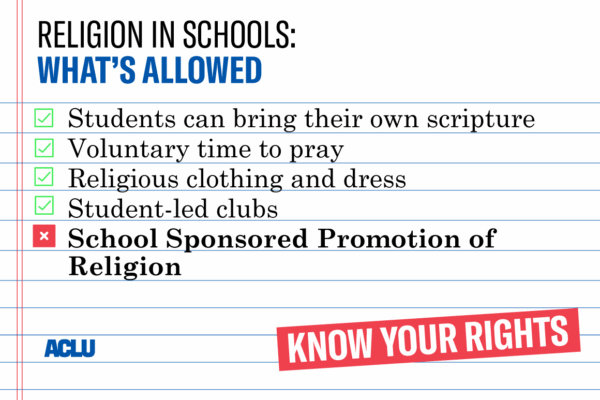This week we learned that a Christian motivational speaking organization was invited to speak at Linton High School in Linton, ND. We sent a letter to the Superintendent to make school officials aware of their Constitutional obligations and to help clarify the law so that they no longer continue to infringe upon the Constitutional rights of their students. That letter is available for download.
Calling all students:
It’s pop quiz time! Let’s find out if you know your religious freedom rights at school. Imagine the following scenario: an assembly is about to take place at a local public school. It features a youth minister who preaches to students and a rock band playing religious songs. Several atheist students feel uncomfortable going to the assembly because it will include prayer. Their teacher tells them they can just watch a movie during the assembly period instead.
Is this assembly:
A. Permissible under the U.S. Constitution; or
B. A violation of religious freedom under the U.S. Constitution
If you picked option B, you’re correct! This assembly violates the constitutional principles of religious freedom. The separation of church and state means that our government, including our public schools, cannot favor one faith over others or religion over non-religion. Under the U.S. Constitution, public school officials cannot preach or promote religious beliefs to students.
In some schools across the nation, public school officials have tried to skirt this rule by inviting outside groups in to preach to students. Courts have repeatedly ruled that this action is also unconstitutional. The bottom line is schools can’t get around the Constitution by bringing in people to preach or promote religion to students as a part of school-sanctioned events. Allowing non-believing students to “opt out” of religious assemblies isn’t a solution, either. The right to believe in no faith at all is just as much a part of our constitutional protections as the right to exercise religious faith, and public schools can’t make non-believers feel like outcasts.
If your school is hosting assemblies that appear to be religiously themed, what should you do? Start by asking yourself a few questions:
- Is the assembly explicitly religious? Does the speaker reference God or ask students to attend church? If the answer is yes, your school may be violating the U.S. Constitution.
- Is the assembly completely secular, meaning it is not religious, and does not contain religious references? If so, your school may be in compliance with the U.S. Constitution. It’s okay for schools to bring in speakers who talk about topics such as the dangers of bullying or the importance of kindness, as long as those speakers aren’t preaching to students or proselytizing (in other words: speakers can’t advocate a certain religion or try to convert listeners to a belief system).
- Is the assembly secular, but the speaker invites students to attend an after-school religious event or promotes church attendance? If yes, your school may be violating the U.S. Constitution. Just as the public school officials themselves cannot promote church attendance, they can’t let speakers come in and promote attendance at religious services.
If your answers to any of the above questions make you think your school is violating your religious freedom, reach out to your administrators and let them know you have the right to attend your public school free of school-sponsored prayer or proselytizing. Download our letter template to help get you started in you religious freedom advocacy efforts.
The role of religion in schools has been one of the most controversial issues in America, and although the U.S. Supreme Court has long made clear that the Constitution prohibits public school-sponsored prayer or religious indoctrination, violations are common in many parts of the country.
Contrary to what you might read elsewhere on the Internet, the ACLU is not trying to eliminate religion from public schools. Students are free to pray voluntarily on their own or in groups during non-instructional time, as long as they do not disturb others and as long as school official do not sponsor or endorse the prayer. We stand up for students who wish to express their faith by wearing rosaries, kufis, uncut hair, or other attire that outwardly signifies their devotion to a particular creed.
The ACLU works to protect public school students’ religious freedom by curbing the practice of school-sponsored prayer and proselytizing while simultaneously ensuring that students may freely express and exercise their faith.
What is not permitted, and never has been, is allowing public school teachers and other officials to use the positions entrusted to them by the State and parents to impose their religious beliefs on students by officially sanctioning religious activities in public schools. The bottom line is that school officials may not subject students to official prayer or proselytizing. This is clearly forbidden by the Establishment Clause of the Constitution.
For more information on the role of religion in public schools, visit our website. You can find stories of the ACLU’s fights to protect religious freedom here, here, and here.


